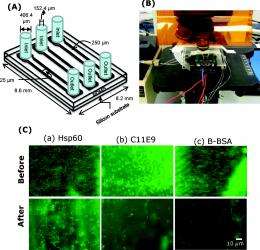New biosensor for most serious form of Listeria food poisoning bacteria

(PhysOrg.com) -- Scientists in Indiana are reporting development of a new biosensor for use in a faster, more sensitive test for detecting the deadliest strain of Listeria food poisoning bacteria. That microbe causes hundreds of deaths and thousands of hospitalizations each year in the United States, particularly among people with weakened immune systems. Their study appears in the current issue of ACS’ Analytical Chemistry.
Arun Bhunia and colleagues note in the new study that fast, highly effective tests already are available for five of the six known species of Listeria. These tests use antibodies that signal the presence of the bacteria. However, no rapid, sensitive tests are available for detecting Listeria monocytogenes, the deadliest of the species, the researchers say.
The scientists describe development of the biosensor using so-called heat shock proteins — which the body produces in response to stress — instead of the antibodies used in other tests. They showed that their new sensor was faster and more sensitive at detecting the deadly bacterium than antibody-based tests. It had a microbe capture rate up to 83 percent higher than antibody-based tests.
The new biosensor will reduce the likelihood of false-positive results for Listeria monocytogenes and may lead to improved tests for detecting other types of dangerous pathogens, the researchers say.
Provided by American Chemical Society (news : web)

















